Chronic Fuel Spills Make Luperon 'Most Polluted Bay from Canada to Trinidad.' Huge Fire Ensues
Displaced by a Cruiseport, Fishing Fleet Threatens Town's 'Brand' as a Safe Yacht Refuge
(Leerlo en Español aqui.)
It happened again just yesterday. The place: Luperon Bay, Dominican Republic.
“There's a heavy scent of diesel up in front of us. It's bad,” a cruiser newly anchored in the bay wrote on a local WhatsApp1 message board. “I can see it on the water.”
“What’s the source?” a second cruiser asked.
“I don't know. It just started to smell. Woke me up,” said the first. “I'm going out in the dinghy to see where it's coming from.”
“Two fishing boats have just left, about 30 minutes,” a third cruiser interjected.
Polluted
This incident—repeated scores of times over—is an example of why the most famous hurricane hole2 in all the West Indies is now also the “the most polluted bay from Canada to Trinidad,” as one source recently told Loose Cannon.
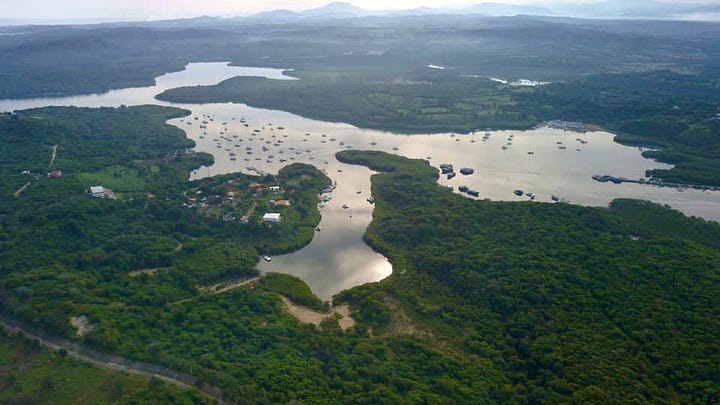

On July 1, I took a stroll down the government dock at Luperon at around 10 in the morning before the trade winds had kicked in. At the end, a handful of big fishing boats and a single Dominican Navy patrol boat lay tied alongside, their crews relaxing in the shade of open pilot houses. A few hundred yards away, more than a dozen more big fishing craft lay at anchor or strapped to the mangroves.
The odor was overwhelming: petroleum. The only question was whether the stink was from spilled gasoline from the fleet’s many outboard small boats, diesel fuel or oily crud pumped out of a bilge.
Conflagration
On May 31, lackadasical fuel management and shabby electrical systems combined in dramatic fashion. According to a source with knowledge of the event, a spark found gas fumes on one of the boats on the government dock and ignited the vessel like napalm. Three boats were destroyed in the fire.
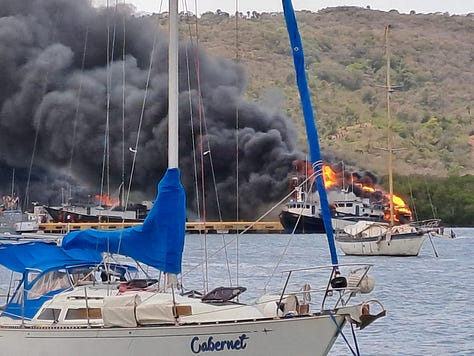
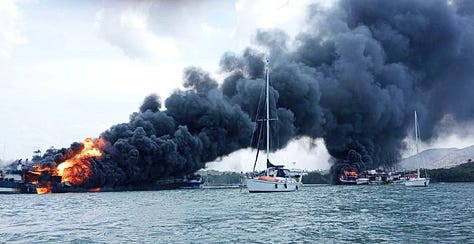
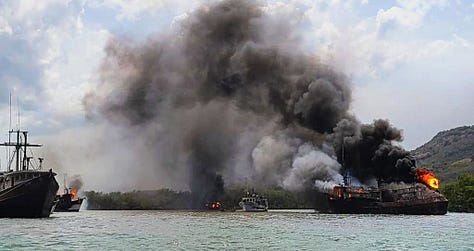
Luperon Rebrands Itself
Once upon a time, Luperon’s economic engine was an all-inclusive seaside resort, but the hotel was abandoned in 2011, leaving Luperon’s 17,000 or so residents with a higher than average rate of unemployment and underemployment.
Bruce Van Sant3 is a legendary figure down island, mainly because of his classic 1990s cruising guide “Passages South: The Thornless Path to Windward.” Not only did the book popularize Luperon as a refuge for sailors en route from Florida to the Lesser Antilles, but it was Van Sant’s home base for two decades.
By 2020, local leaders had decided to double down on the bay’s advantages. Luperon was a safe place to wait out hurricane season; it had a marina and a separate DIY boatyard for small craft, and the cost of living was low.
The town rebranded itself, building a gate along the main road topped with a stylized sailboat. A Dominican entrepreneur who is also a sailor, Fernando Capellan made plans to build a second, high-end boatyard able to haul big catamarans like his own Sunreef 70.
There are now eight restaurants in Luperon—most operated by ex-pats or cruisers—serving international cuisine as an alternative to traditional Dominican food. Besides the cruising community, their customers include foreigners living shoreside and the growing Dominican middle-class.
On Jan. 28, 2021, Dominican President Luis Abinader inaugurated a $5 million wastewater treatment plant, a response to the longstanding problem of residential effluent seeping from Luperon’s septic systems into the bay. Abinader was joined by Capellan and action star Vin Diesel,4 who was with the president on an investment tour of the North Coast.

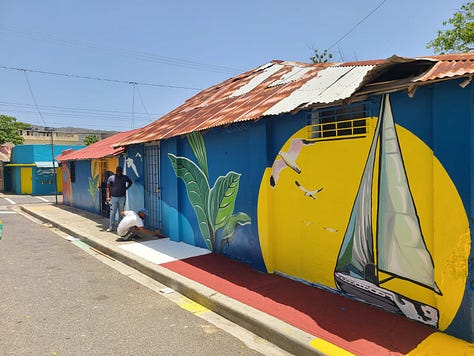
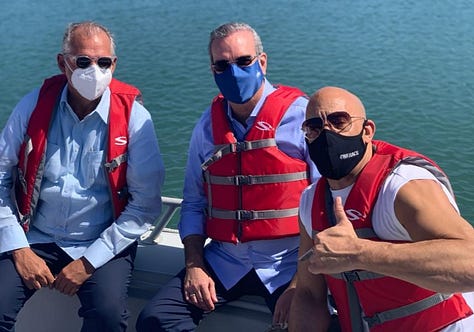
Puerto Plata Rebrands Itself, Too
To the east and about 45 minutes away by car is Puerto Plata. As a tourism destination, the Dominican Republic’s third largest city had been overshadowed by Punta Cana, the island’s easternmost region and a resort Mecca.
Carnival Cruise Lines offered Puerto Plata an alternative to the all-inclusive-resort formula, and in 2015 Carnival opened a cruiseport at what had been a rustic cove on the outskirts of the city. Thus, Amber Cove was created.
By December 2021 Puerto Plata was doubling down on the formula. It opened a non-denominational cruiseship port along its own, heretofore commercial harbor. The cruiseport was named Taino Bay after the island’s extinct indigenous peoples.
The cruise industry eschews the rough edges of places like the Dominican Republic and hurries to reinterpret—that is, Disneyfy—local landscapes. They like to control the view, you might say.
So, in pursuit of cruise-ship dollars, blocks of Puerto Plata downtown were prettified; a rustic waterfall attraction not far from Luperon was fenced off, landscaped and monetized, and, as this is being written, a funky beach in Sosua is being transformed into…well…something else, something slicker.
Apparently, the presence of rusting, ramshackle, fuel-leaking fishing boats isn’t the right look for the happy campers arriving on Disney, Norwegian, Celebrity, et al., when the desired vibe is supposed to be this:

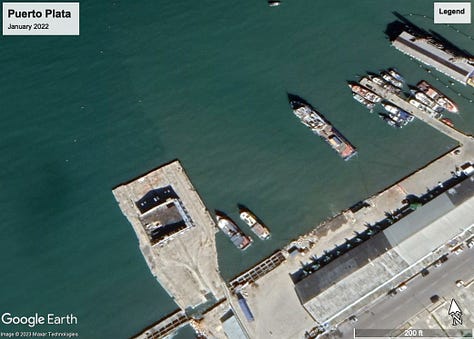
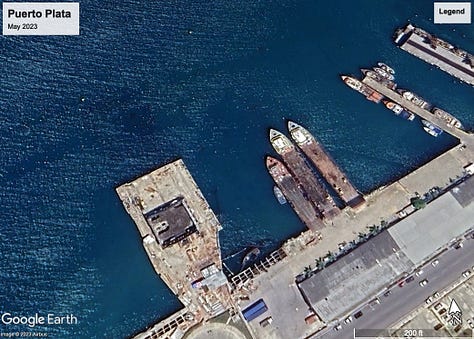
Luperon’s Brand Loses the Toss
José Ramón Reyes is Dominican environmental vice-minister for coastal affairs. He and everyone else interviewed for this article view the presence of the fishing fleet in Luperon as a horrible state of affairs. “I know the problem, and you are right. We have to apply some measures to solve it,” Reyes told Loose Cannon.
Capellan, whose family organizes an annual clean-up of litter and plastic in Luperon Bay, said that much is happening behind the scenes among the various stakeholders. He said measures under consideration include amending proposed federal legislation to specifically address the fishing fleet problem.
The Dominican Navy isn’t like ours. It functions more like a combination of Coast Guard, Florida Fish & Wildlife and a county sheriff’s marine patrol. (Mostly, it monitors the comings and goings of all vessels in territorial waters via a permitting system.) The Navy comandante for Luperon was sent a message asking why he was allowing crimes to happen in his zone of responsibility and right under his nose.
The comandante got the message but did not reply, which is not surprising since this role is usually assigned to a young, low-ranking officer. But I am hoping to write a follow-up story once Reyes, Capellan and other influencial individuals are ready to go into more depth about the issues raised here.
I am hoping to write a follow-up story once Reyes, Capellan and other influencial individuals are ready to go into more depth about the issues raised here.
In April, the Dominican news outlet Acento had a go at the story, focusing on damage to the mangroves5 and likely future harm to the local economy. “Luperón is a very fragile ecosystem to have these vessels in the bay. The contamination and destruction of the mangroves can be seen,” an unnamed source told Acento. “Additionally, they occupy the space of boats that could come to spend money in the town and give it life. It is painful.”
Politically Connected
Traditionally, the Puerto Plata fleet fished the Silver Banks, which belong to the D.R. Boats from Luperon have also been caught poaching in the waters of the Bahamas and Turks & Caicos—high profile cases. According to two sources, however, some of the vessels fish the banks off Jamaica, about 450 nautical miles to the southwest via the Windward Passage.
For some reason, the fishermen cannot simply be ordered to quit spilling fuel, nor can they be told to relocate. Relocate where? Certainly, the boats fishing off Jamaica could relocate to a port on the country’s South Coast, but the rest? As it now stands, the short explanation for everything is that “it’s very complicated.”
Apparently, according to several people interviewed for this story, the fishing fleet in Luperon enjoys a high degree of political protection in the capital.
Marvin del Cid is one of the Dominican Republic’s top environmental reporters, and he has written about Luperon in the past for one of the country’s biggest newspapers Diario Libre, though not specifically about the fishing fleet. Del Cid is familiar with the issue, however. “Those fishing boats are a problem in the bay. But there are powerful people involved in the business,” he said.
WhatsApp is a secure texting and VOIP telephone service that is the communications app of choice in the Dominican Republic (and much of the world). The WhatsApp channel in question is for communication among Luperon’s cruisers and expats.
PassageMaker magazine, Aug. 28, 2019: “Once Again the Storm Goes North, Away From Hurricane Hole.”
Bruce Van Sant and the Misdiagnosis That Launched a Sailing Classic
Legendary cruising guide author Bruce Van Sant defines work as “doing something you don’t like, when you don’t feel like it, for someone you dislike, for too little recompense.” I had a few beers with Bruce rec…
Vin Diesel is a good friend to the Dominican Republic. He spends a lot of time there and is investing in some major projects. Coincidentally, as this was being written, the Hollywood action star was working on a movie at Cambiaso, a beach village a few miles to the east of Luperon.
For anyone doubting the seriousness of the consequences of chronic fuel spills on mangroves, read this:




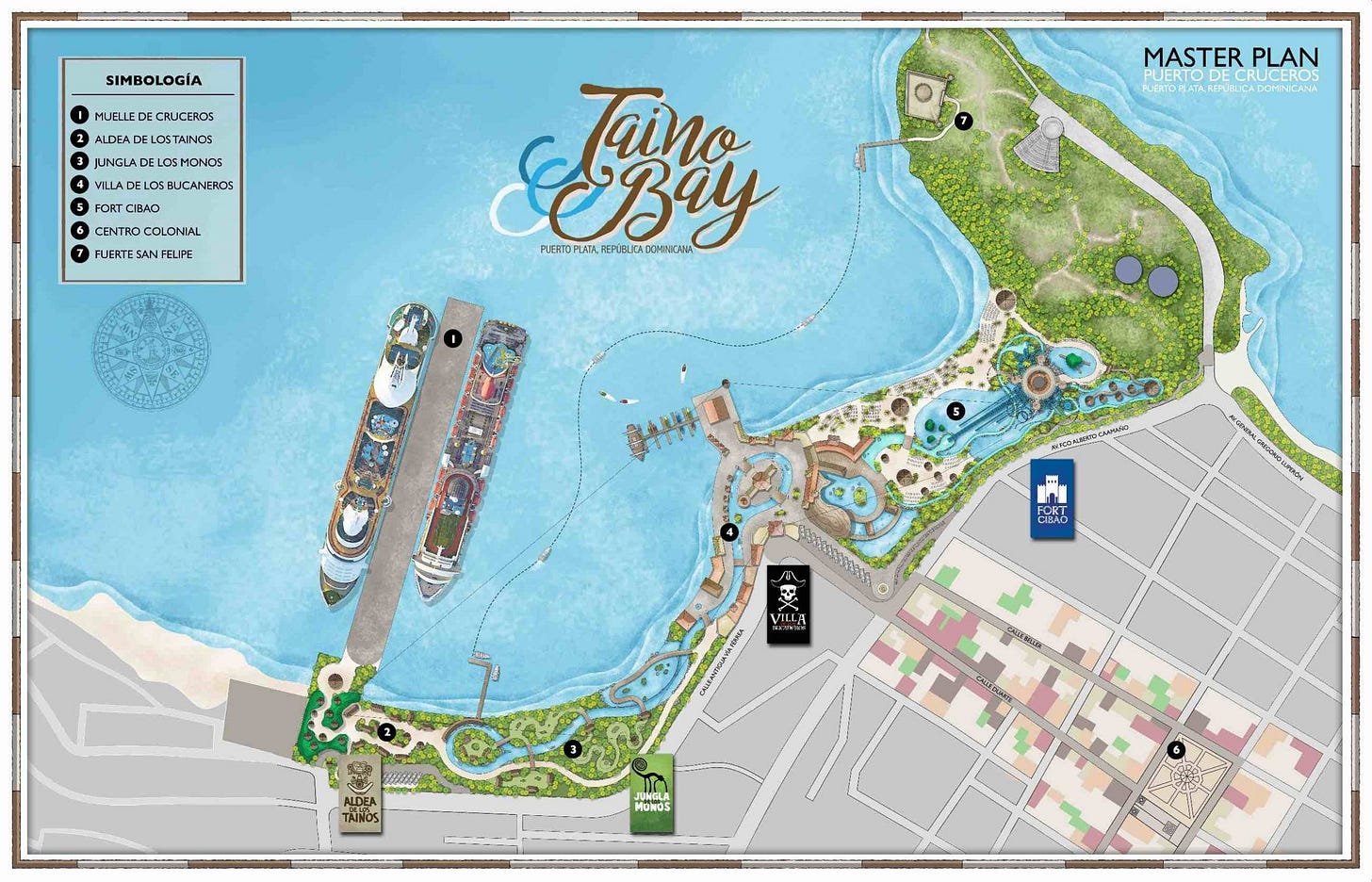

There are powerful folks who want to clean it up. Capellan is probably the richest person in the Dominican Republic and is good friends with the President. This president cleaned up the Puerto Plata port for cruise ships (30 due this month alone!) I have no doubt there will be much more happening to clean up the area.